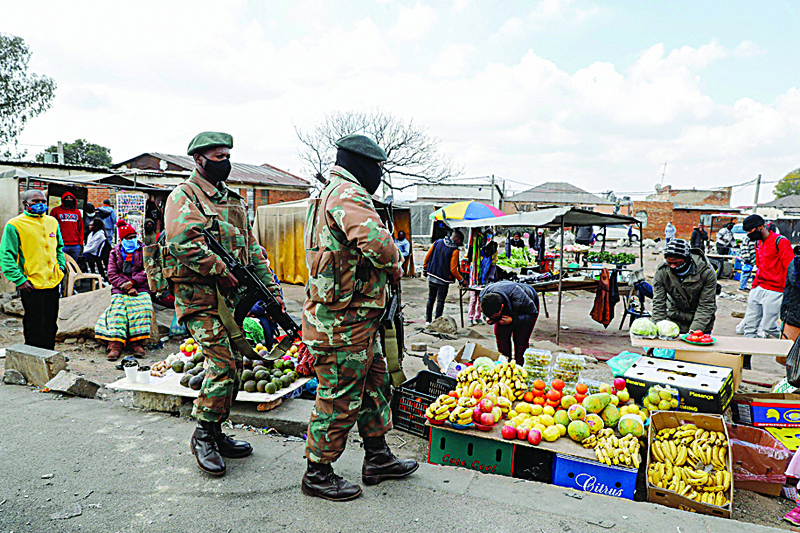 ALEXANDRA, South Africa: People stand and watch at a food market as members of the South African Defence Force (SANDF) patrol their area in Alexandra township, Johannesburg yesterday. - AFP
ALEXANDRA, South Africa: People stand and watch at a food market as members of the South African Defence Force (SANDF) patrol their area in Alexandra township, Johannesburg yesterday. - AFPJOHANNESBURG: South Africa mustered its army reserves yesterday in a bid to quell looting that has stoked fears of shortages and dealt a crippling blow to its already battered economy. "All reserve members are to report for duty at first light tomorrow morning 15 July 2021 at their respective units," army chief Lieutenant-General Lawrence Mbatha said in orders issued overnight as the unrest entered its sixth day.
Soldiers should "report ready with their necessary equipment," the defence ministry said in a statement. On Wednesday, the government said it would call out around 25,000 troops to tackle the emergency -- 10 times the number that it initially deployed. As relative calm returned to Johannesburg, Police Minister Bheki Cele hailed the boost from the military, saying he was confident it would "turn around the volatile situation in parts of KwaZulu-Natal" province, the epicentre of the unrest.
Stores and warehouses in the two provinces have been ransacked, devastating supply chains on which food, fuel and medicines depend in Africa's most industrialised economy. According to official figures, 72 people have died and more than 1,200 people have been arrested, while South Africa's consumer goods regulatory body estimates that more than 800 shops have been plundered.
Looting continued yesterday in KZN, but the situation was quieter in Johannesburg, where volunteers in the city's townships took part in cleanup operations, one of which was led by Environment Minister Barbara Creecy. At a cleanup at the Jabulani shopping centre in Soweto, community leader Musa Mbele-Radebe, 30, told AFP, "The use of the army is quite good, because our people are quite scared of the army compared to the police. "It only took four soldiers to control a situation of a thousand (people) that was gathering in this mall."
Zuma protest
The unrest began a day after former president Jacob Zuma-who commands support from some of the country's poor-began a 15-month jail term on July 8 for refusing to testify to a commission probing corruption under his tenure. Protests quickly turned into looting as crowds pillaged shopping malls, hauling away goods as police stood by, seemingly powerless to act. As the crisis escalated, the armed forces on Monday said they were sending 2,500 troops to help restore order.
The figure was criticised by many as paltry, given that 70,000 soldiers were deployed last year to enforce a strict coronavirus lockdown. On Wednesday, Defence Minister Nosiviwe Mapisa-Nqakula told parliament she had submitted a request for "plus or minus" 25,000 troops. The request came after President Cyril Ramaphosa told leaders of political parties that parts of the country "may soon be running short of basic provisions" following disruption to supply chains.
"The next big crisis will be the threat to food security in KZN, along with the supply of medication and fuel," said John Steenhuisen, head of the opposition Demcratic Alliance. "Protecting these supply chains must be a priority of the... deployment." TV footage of the casual looting has deeply shocked many South Africans. Business confidence has been savaged at a time when the economy is already mired in unemployment, especially among young people.
Michael Sun, a DA safety and security official in Johannesburg, said he went on a tour of the city and saw a car dealer whose 50 vehicles were just burnt-out shells. "The devastation is really bad," he said. "Lots of the people are salvaging what they can get. Lots of the smaller businesses don't have insurance-they are struggling."
Vigilantes
Locals have started forming vigilante groups to protect infrastructure in their neighbourhoods. Clashes have erupted in Durban between black South Africans and counterparts of Indian heritage. On Wednesday night, Cele visited Phoenix, a predominantly Indian community where 15 people have been killed in clashes. The hashtag #PhoenixMassacre was trending yesterday.
"The Indian nation here in KZN is the second largest outside of India," the new Zulu king, Misizulu Zulu, said in an appeal to his community on Wednesday. "We have lived in peace for many years alongside them. Therefore I ask: Let us be understanding and thoughtful towards each other." - AFP










